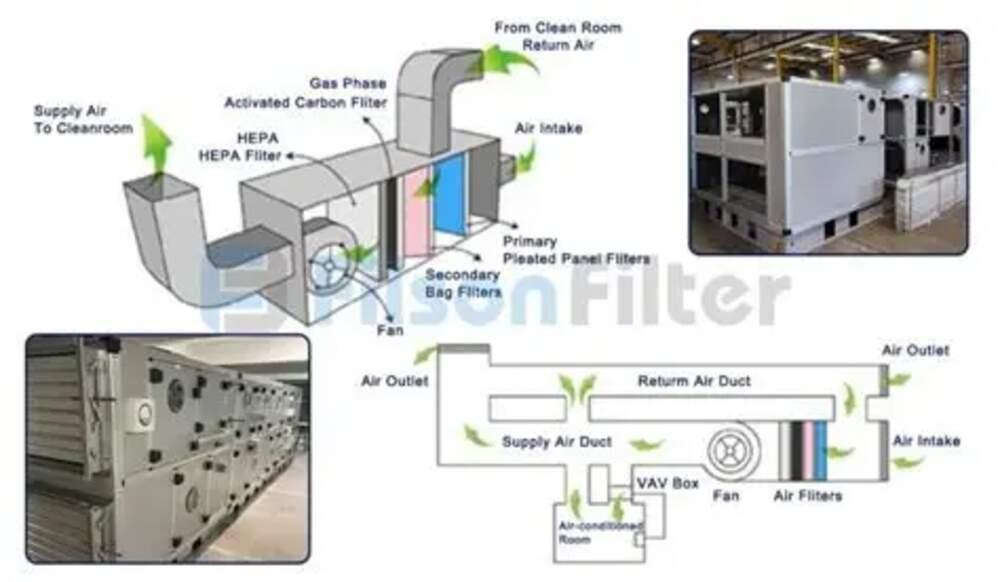How to Choose the Appropriate AHU Filter

Air Handling Units (AHUs) are the backbone of heating, ventilation, and air conditioning (HVAC) systems in both homes and commercial buildings. At the heart of every AHU lies the filter—the component that ensures clean, safe, and efficient airflow. Choosing the right AHU filter is not just about maintaining air quality. It’s about energy efficiency, equipment longevity, and the health of occupants.
This guide explains the essentials of AHU filters, what to look for when selecting one, and how to balance performance with practical needs for your building - https://acjakarta.com.
Why AHU Filters Matter
The filter in an AHU performs three critical roles:
Protecting the equipment by keeping dust, pollen, and airborne particles from clogging coils and fans.
Improving indoor air quality by removing contaminants that can affect health and comfort.
Supporting energy efficiency by reducing strain on the system, which in turn lowers operating costs.
Neglecting the filter—or choosing the wrong type—can lead to poor air circulation, higher energy bills, and frequent maintenance issues.
Types of AHU Filters
Before deciding, it’s important to understand the main types of AHU filters available:
Panel Filters: Lightweight and cost-effective. They are suitable for basic dust removal in residential AHUs or as a pre-filter in larger systems.
Pleated Filters: Offer more surface area and higher dust-holding capacity. These are common in offices and schools where air cleanliness is a priority.
Bag Filters: Designed for commercial or industrial applications, they handle higher airflow and provide greater efficiency in trapping fine particles.
HEPA Filters: High-Efficiency Particulate Air filters remove up to 99.97% of particles. They are critical in healthcare facilities or environments where air purity is non-negotiable.
Carbon Filters: Used where odor and gas control are required, such as in laboratories or kitchens.
Each filter type serves a specific role. The right choice depends on your building’s air quality needs and system requirements.
Key Factors When Choosing an AHU Filter
1. Filtration Efficiency
Look at the MERV rating (Minimum Efficiency Reporting Value). For homes, a rating of 8–11 typically balances air quality and airflow. Commercial or healthcare environments may require higher ratings, such as MERV 13 or above.
2. Airflow Resistance
High-efficiency filters can sometimes restrict airflow, which forces the AHU to work harder. It’s important to match the filter’s resistance with your unit’s capacity to avoid unnecessary energy use.
3. Building Type and Usage
Residential Homes: Comfort and dust control are usually the priorities.
Offices and Schools: Focus on air quality to reduce allergens and maintain productivity.
Hospitals and Labs: Maximum filtration efficiency to protect against airborne contaminants.
Industrial Facilities: Balance between heavy-duty particle capture and system performance.
4. Maintenance and Replacement
Consider how often the filter needs to be replaced. Pleated and bag filters usually last longer than flat panel filters, while HEPA filters require careful handling during maintenance.
5. Energy Costs
A filter that saves energy while maintaining performance pays for itself. Low-pressure-drop filters are designed to reduce resistance, lowering the AHU’s workload.
Practical Advice for Building Owners
Assess Air Quality Goals: Do you need basic dust control, or do you need medical-grade filtration? Define this first.
Check Manufacturer Guidelines: Always ensure the filter is compatible with your AHU model.
Plan a Replacement Schedule: Even the best filter fails if it’s not replaced on time. Regular checks are essential.
Consider Multi-Stage Filtration: Many systems benefit from using a pre-filter to capture large particles, followed by a higher-grade filter for finer contaminants.
The Bottom Line
Selecting the right AHU filter is a strategic decision that affects indoor air quality, energy efficiency, and equipment life. For homes, panel or pleated filters often suffice. For commercial buildings, bag or HEPA filters may be necessary to meet higher standards.
The key is to align the filter choice with your system’s capabilities and the specific demands of your space. When in doubt, consult with an HVAC professional or your AHU manufacturer. A thoughtful choice today can prevent costly issues tomorrow.
- Art
- Causes
- Best Offers
- Crafts
- Dance
- Drinks
- Film
- Fitness
- Food
- Juegos
- Festival
- Gardening
- Health
- Home
- Literature
- Music
- Networking
- Other
- Party
- Religion
- Shopping
- Sports
- Theater
- Wellness



